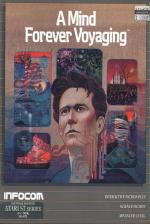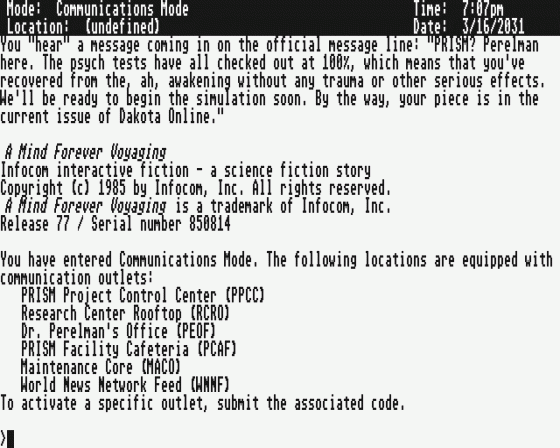
Atari User
 1st December 1985
1st December 1985
Categories: Review: Software
Author: André Willey
Publisher: Infocom
Machine: Atari ST
Published in Atari User #8
A Mind Forever Voyaging
A new product from Infocom is always something to be eagerly awaited, so when I got a phone call to say that a new Infocom title had just arrived in ths country I was eager to try it out. When I found that it was written by the same guy who gave us Planetfall, Sorcerer and Hitch-Hiker's, and that it was only available for the Atari ST, being much too large and complex to fit into the 8-bit range, I was doubly interested.
Thus, the very next day, thanks to the efficient staff at Software Express, I sat down at my desk, powered up the ST, and placed the A Mind Forever Voyaging disc in the drive. And I suddenly discovered that my entire life to date was nothing more than an electronic illusion created inside the massive memory banks of the Prism super-computer.
This fact is, perhaps, a little disconcerting, so I'll explain. Early in the 21st Century, Doctor Abraham Perelman was involved in a project that would bridge the gap between computer "Expert Systems" and the workings of the human brain.

He proposed an artificial intelligence simulation which mimicked in every way the learning processes of the human brain.
Thus the Prism computer was designed, and hooked into five other massive mainframe computers which would provide the substance of the simulation fed into Prism.
It would be fed from the outside world with everything a normal child could see and hear, and its reactions to this input would cause the projection to alter accordingly.

This process would take many years to complete, in the same way that the human learning process takes many years. Meanwhile, a small boy was growing up in Downtown Rockvil. He went through all of the normal growth pains of any child in middle America.
He got lost in the local supermarket, was bullied at school, wanted to become a writer...
Then, at the age of thirteen, Perry's father died, and the family moved into an apartment in the more seedy part of town. At the age of 20, just as he had met and fallen in love with Jill and was thinking of settling down with her, he found himself at a rather strange job interview with a magazine editor.
They were discussing perception - how does one know that the real world is not an illusion generated by the mind?
As they talked, everything around him simply faded away, and he heard the voice of Abraham Perelman, talking for the first time directly to his creation, Prism.
Given this background, you are also informed that the world situation is grim. Crime and urban decay are rampant, and there is extreme overpopulation and poverty.
Senator Richard Ryder has proposed a "Plan for Renewed National Purpose", and the intention is to use Prism to create and study the effects of this plan on a simulation of the world 10 years hence.
If this were an ordinary adventure, you would expect to play Perelman and the computer would follow your orders to gather information. However, this is no ordinary adventure - this is a state-of-the-art Infocom game, and so you actually play Prism, and must explore for yourself - reporting back to Perelman via the keyboard.
You can contact him, and other members of the research team, via communications outlets around the establishment (a little like Hal's voice/vision terminals in the film 2001).
You may also communicate with any one of the five simulation control computers and give them new instructions. You can even tie into a vast library and into the world news network.
I received my instructions from Dr. Perelman, and activated the simulation mode. After entering the relevant colour codes from the code-wheel provided in the package, I was transported from my cosy world of 2031 into a simulation of 10 years hence.
A map of Rockvil circa 2031 is provided, but this doesn't really help you with anything other than major landmarks, as much development has taken place by now, and there is a lot of city to explore.
I took the underground to the other side of the city, being careful to record my journey to play back to Perelman later, and had a meal at a rather expensive restaurant.
Quickly finding out where I lived, I then tracked down my little apartment and visited Jill and our little baby.
Those familiar with Infocom prose will know that the events that take place are vividly described, and take on the same degree of reality that a good novel would as you lose yourself in its pages.
In contrast to many Infocom titles, however, the emphasis is not so much on problem-solving as on the control of the situation you're involved in.
You find out intriguing tit-bits of information about life in the future, meeting and chatting to people as you go.
Still, I soon found that I had completed all the tasks set by Perelman, and I reverted to communication mode to tell him what I'd discovered, and based on my information, the plan was approved.
Perhaps on a standard cassette-based adventure, things would end there, but not with Infocom.
Perelman also told me that the information that I had provided had enabled his team to extend the simulation by a further ten years.
He seemed rather too busy to give me further detailed instructions, so, being the inquisitive computer I am, I set off to see for myself...
And the world has become a shadowy place, full of gloom and suspicion. The secret police raid my house, and terrify Jill.
My brother seems to be in some sort of trouble. The plan has obviously backfired, and it seems to be up to me to find out why, and warn Perelman before it's too late.
Against this nightmare combination of 1984 and Brave New World, the saga continues.
I can thoroughly recommend this adventure to anyone who likes a challenge and wants to get the most from their ST, as it is perhaps the most fascinating concept that Infocom has yet come up with.
Gone are the tricky problems and funny solutions of Steve Meretzky's last game, The Hitch-Hiker's Guide To The Galaxy, an excellent game in its own right - and in their place is a frighteningly realistic view of a future we all hope we can prevent.
I'll let you know how I get on.



